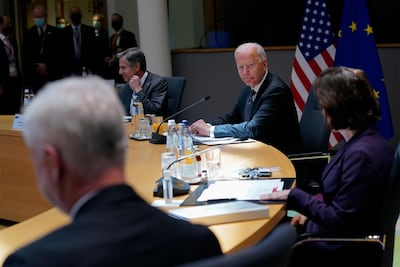The US and the EU ended a 17-year dispute over aircraft subsidies to Airbus and Boeing on Tuesday, removing billions of dollars of export tariffs and boosting their respective economies in turn.
US President Joe Biden agreed to a truce to the transatlantic feud when he met EU leaders on Tuesday in the Belgian capital of Brussels, with both sides set to remove taxes on $11.5 billion of goods such as cheese, tractors and tobacco for five years.
Quoting Irish poet W B Yeats at the start of his first EU-US summit as president, Mr Biden said the world was shifting and that Western democracies needed to come together.
"The world has changed, changed utterly," said Mr Biden citing from the poem Easter 1916.
The accord resolves one of the world’s longest trade disputes in a move that will boost the coffers of both US plane maker Boeing and Europe’s Airbus while offering relief to other industries affected by the tariffs.
Airbus said yesterday that it welcomed news of the agreement, which will officially come into effect on July 11.
“This will provide the basis to create a level playing field, which we have advocated for since the start of this dispute,” an Airbus representative said.
“It will also avoid lose-lose tariffs that are only adding to the many challenges that our industry faces.”
The dispute between the US and EU has escalated over the past 17 years, with tariffs imposed over a mutual frustration with state subsidies for the two plane makers.
The deal sets the stage for a new era of transatlantic co-operation that will also help to lift uncertainty in the aviation sector and remove fears that EU and US consumer goods would be hit with a fresh round of punitive tariffs.
“This meeting has started with a breakthrough on aircraft,” said European Commission chief Ursula von der Leyen. “This really opens a new chapter in our relationship because we move from litigation to co-operation on aircraft – after 17 years of dispute ... Today we have delivered.”
The duties were suspended in March after the EU and the US agreed to lift them for four months as they negotiated a solution.
In recent months, officials on both sides have agreed that the duties were something they could ill afford as they look to co-operate in dealing with a threat posed by China’s nascent commercial aircraft industry.
Concerns are growing that state-sponsored Commercial Aircraft of China, or Comac, is on track to become a legitimate rival in the commercial aircraft industry by the end of the decade.
US trade representative Katherine Tai last month said she was optimistic about reaching a deal with Brussels and that the two sides needed to look at "the bigger question" of China's ambitions to become a global player in the commercial aircraft industry.
“Today’s announcement resolves a long-standing irritant in the US-EU relationship,” Mr Tai said, following news the trade dispute had ended.
“Instead of fighting with one of our closest allies, we are finally coming together against a common threat.”
On Monday, US Chamber of Commerce senior vice president Marjorie Chorlins said there was “no question that the rise of China's aircraft industry was on everybody's proverbial radar”, noting what she described as China's "heavy subsidisation" of industry.
She said settling the dispute would provide "a tremendous boost of goodwill" for broader US-European ties.
Companies in Europe and the US have long campaigned for a solution to the aviation trade dispute between Boeing and Airbus, which has dragged on since 2004.
The disagreement arose when the US withdrew from a 1992 aircraft subsidy pact and took the EU to the World Trade Organisation, claiming Airbus had managed to equal Boeing's share of the jet market thanks in part to subsidised government loans.
The dispute was escalated in 2019 when the WTO authorised the US, then under the Trump administration, to level annual tariffs against $7.5bn of EU exports over government support for Airbus, while the bloc won permission to hit back with levies on $4bn worth of US goods.
The two sides have adopted a more conciliatory stance on the dispute since Mr Biden took over from Donald Trump at the start of this year.



